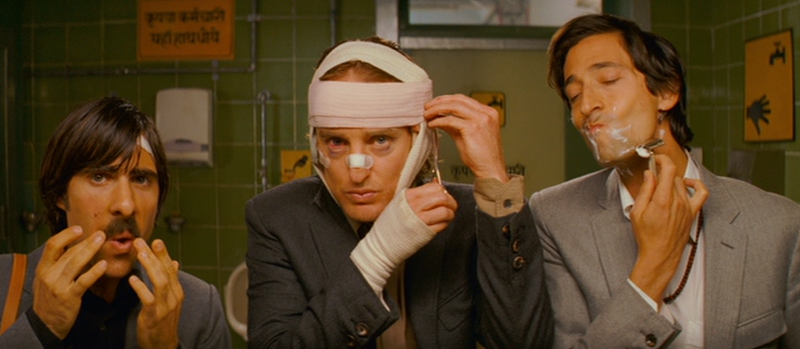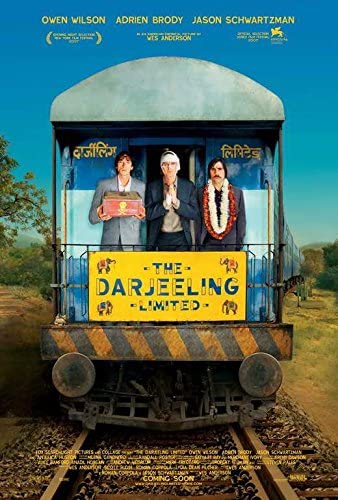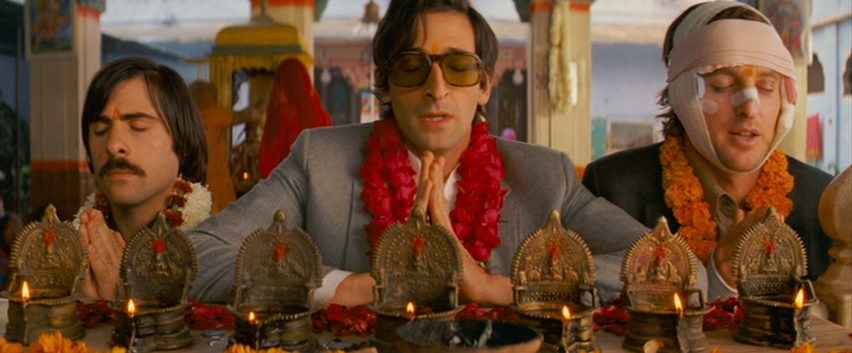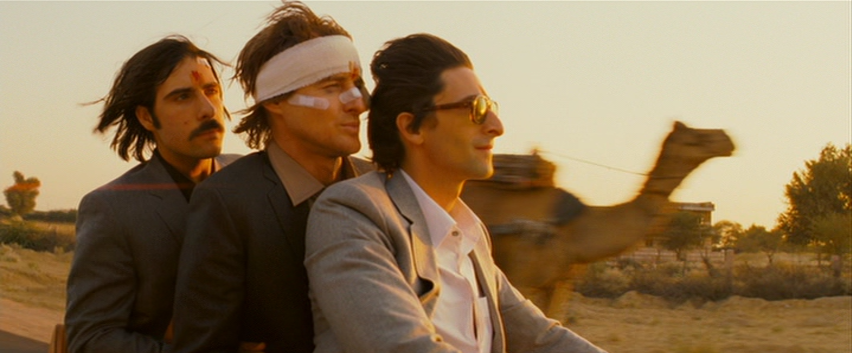

“I wonder if the three of us would’ve been friends in real life. Not as brothers, but as people.”
It is hard to mistake a Wes Anderson film as anything but a Wes Anderson film, and The Darjeeling Limited is no exception. Take the side-scrolling camera movements, the direct overhead shots, the perfectly symmetrical framing, the just-barely-into-the-realm-of-the-absurd premise, even just take the cast list: Owen Wilson, Jason Schwartzmann, Adrien Brody, Bill Murray, Wallace Wolodarsky, Anjelica Huston, Waris Ahluwalia; all point to this film being cut from the same cloth as the other films in Anderson’s oeuvre.
For some, the Wes Anderson style can be grating. When I was introduced to him by a friend, he recommended that I watch The Life Aquatic with Steve Zissou, explaining to me that many Anderson fans felt this was his weakest film, while many film fans who did not typically enjoy his films enjoy it the most. His point was twofold: this type of quirky and idiosyncratic movie is not for everyone, and people hold strong opinions about Wes Anderson.
The film begins with a brief cameo from Bill Murray, trying and failing to catch his train as it pulls out of the station. Peter Whitman (Adrien Brody) nonchalantly jogs past him and catches the train just in time, before meeting his brothers (Owen Wilson and Jason Schwartzmann, the latter of whom also has a co-writer credit) on board. He has not seen them since their father died a year ago, and they were not always on pleasant terms prior to that. Immediately the eldest brother, Francis (Wilson) takes on the role of leader, much to the annoyance of his brothers—he arranged the mysterious trip, booked them all the shared cabin on the train, and has hired an assistant to update their itineraries daily. He decides where each of them will sleep and what they will order for dinner and dessert. As the waitress takes their dessert requests, Francis speaks for them all. “Let’s see. Do we want sweets or fruit? I’m going to have the pudding. Jack, you want to try the cake? And Peter, what looks good to you? The cookies?” Noticing Peter’s glare, Francis tells the waiter that Peter will order for himself. “The cookies,” Peter says.

Though he doesn’t tell his brothers at first, Francis has hired a private investigator to track down their mother (Angjelica Huston), who had fled after their father’s funeral, and she was traced to a convent in India. So under the guise of a spiritual journey, which the brothers in almost all respects treat with triviality and whimsy, the brothers begin an odd trip to a variety of locations.
Anderson is very adept at giving his characters defining traits that have small-scale payoffs. The idiosyncratic brothers in Darjeeling each have their quirks—Peter has a penchant for borrowing the personal effects of others, including those of their dead father; Francis tends to assert control over those around him without realization that he is stepping on their toes; and Jack writes short stories that are thinly veiled retellings of episodes in his own life.
These eccentricities are established early, and each has a payoff later in the film. When the brothers are praying at a shrine to an Indian deity, Francis realizes that Peter is wearing his belt, and makes him take it off and give it back. Later in the film, Francis gives Peter the belt as a gift for his soon-to-be-born son. Francis continuously speaks for his brothers, and has a habit of suggesting his plan first and then requesting that everyone else agree with it. Late in the film, when they finally meet their mother, she assumes the role that Francis had taken earlier, telling her sons they each will have for breakfast. “Peter, fresh mango. And corn flakes for you, Francie.”
When the brothers are first reunited, Jack tries to share one of his stories with his brothers. Once Peter finishes reading it, he says, “Well, I’m not too crazy about the part where I start screaming at the mechanic. That never happened.” Jack replies, “The characters are all fictional.” But at the end of the film, when he reads another story aloud to them, Peter tells him, “I like how mean you are.” The story he had read is a retelling of The Hotel Chevalier—the short film that serves as a prologue to The Darjeeling Limited. Jack begins to reply the same way he had before, but then drops the charade. “The characters are all… thanks,” he says with a smile.

The most enduring scene is when the brothers try and fail to save a drowning boy’s life, and then are invited to attend his funeral, during which we flashback to their father’s funeral a year prior. They would like to drive their deceased father’s car to the funeral, but it is currently being serviced at a local garage. This is the scene where Peter “starts screaming at the mechanic.”
While the cohesion in the narrative is propped up by these seemingly inconsequential details, there is some depth here. The journey is characterized by their mutual annoyance with one another, their arrogance due to their familial wealth, and the emotional abandonment they experienced at the hands of their parents. There is a moment when Francis asks a question that his brothers leave hanging in the air: “Did I raise us, kind of?” These topics are all glossed with comedy and idiosyncratic Andersonisms. There is a bit heavy-handed nod toward the idea of letting go of past baggage as the brothers literally drop their father’s matching set of luggage (which they had themselves been using throughout the film) as they try to catch a second moving train at the end of the film. It seems that the film was always first and foremost a comedy, and so the transformative elements need not be prominent. The character study can remain submerged beneath a gloss of comedic and stylistic flourishes and still be relevant. In fact, excelling in several different areas is what makes the film so good.
The cast is mostly excellent, and the material they have to work with is rich. As mentioned earlier, many of these actors have worked on Anderson films before, and it is likely the case that Anderson wrote these characters specifically for the actors. Certainly, there are numerous instances where a light comedic moment could have fallen flat in lesser hands. Wilson, Brody, and Schwartzmann all handle the material wonderfully, with Wilson’s performance in particular anchoring the film. I do not think the film would work at all with a different actor, which is both positive and negative. The positive is that he totally owns the part, and his acting is effortless; the negative is that I don’t think of the character as Francis—I think of him as Owen Wilson in the Wes Anderson movie about the brothers on the train.
If you like Wes Anderson, you’ll like The Darjeeling Limited. If you don’t, it’s still an enjoyable comedy, but it will not fill a void in your movie-watching heart.